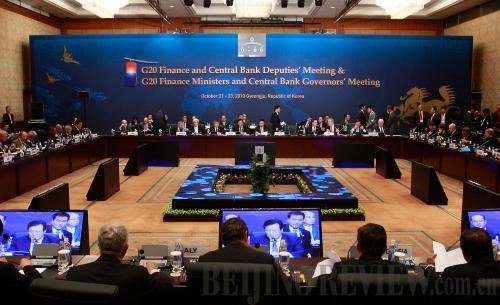|
 |
|
THE BIG ISSUE: G20 financial ministers and central bank governors discussed the currency issue at a meeting Gyeongju, South Korea in October, which will be a major topic at the G20 summit in Seoul on November 11-12 (XINHUA) |
The threat of a currency war is obviously a major topic at the G20 summit in Seoul, South Korea, on November 11-12.
Currently, most developed countries are still mired in economic slowdowns, while emerging economies have managed to secure heightened growth rates. Room for more aggressive fiscal stimulus in developed economies such as the United States, the EU and Japan is limited due to rising fiscal deficits and government debts. And the sovereign debt crisis in the euro zone has certainly done nothing to alleviate the economic unease. Now, they are scheming to propel economic development through monetary policy adjustments, which involves depreciating their own currencies or forcing emerging economies to appreciate theirs.
Hoping to boost exports, the United States, EU and Japan announced successive rounds to quantitatively ease their monetary policies.
Emerging economies aren't without problems of their own—concerns about inflation are rampant due to the economic rebound from the financial crisis. And as developed countries mostly adopt zero-interest rate policies, these measures are pushing emerging economies into a corner of appreciation. For instance, Brazil's benchmark interest rate stands as high as 10.75 percent, causing the Brazilian real to appreciate more than 30 percent against the U.S. dollar, the fastest appreciating currency in the world.
Central banks in emerging economies like Brazil, India, South Korea, Thailand, Malaysia and Russia have interfered with the currency exchange markets out of fear of an export slump caused by the currency appreciation. The interference has not gone unnoticed, as developed countries are pointing fingers and accusing emerging economies of manipulating their currencies. Emerging economies in turn have argued developed countries are using loose monetary policies to trigger depreciations of their currencies.
The world economy is at a crossroad where all countries are trying to keep their currencies competitive to spur exports. Already, the scenario bears a striking resemblance to the currency war in the 1930s following the Great Depression—and that currency war only managed to push the world deeper into recession. A currency war, if breaks out now, is likely to play out the same way.
A very bad idea
Although disputes over currency policies are on the rise, the situation is far from being an actual currency war, said Zhou Yu, an expert on international finance and currency at the Shanghai Academy of Social Sciences.
Zhou said all countries must strive to prevent a currency war, since an open conflict would only spell disaster for the world economy.
A currency war, Zhou said, would first increase the risk of inflation. If other countries blindly follow the U.S. method of quantitative easing, this "herd mentality" would trigger a rampant flow of liquidity. Judging from past experiences, the depreciation of the U.S. dollar will inevitably prop up the value of raw materials, crude oil and agricultural products, which will cause cost-driven inflation. In the second half of 2010, the U.S. dollar's depreciation has led to a substantial increase of wheat, corn and cotton prices by 50 percent.
The inner stability of the international monetary system would also be shattered, Zhou said. The fluctuation of the U.S. dollar has a huge impact on international financial stability. At present, more than 60 percent of the reserved currencies of central banks around the world are in U.S. dollars, and 50 percent of international settlement is done using the U.S. currency. If the dollar depreciates dramatically, economies using the dollar as a settlement or reserve currency will face heavy pressures.
What's worse, a currency war could escalate into a global trade war. As it stands, it will be nearly impossible for developed countries to increase their exports through currency depreciation as many emerging economies are interfering with the currency exchange markets. Under these circumstances, developed countries tend to adopt protectionist measures, such as threats of trade sanctions, to force emerging economies to appreciate their currencies.
No matter the cause, a currency war will increase the risks facing emerging economies. The U.S. monetary policies could lead to large capital inflows into emerging economies as the yields in emerging markets are much higher than those of developed countries. In turn, if those countries tolerate the dollar depreciation, their external trading conditions will take a beating. But if they interfere with their foreign exchange markets and prevent their currencies from appreciating, their inflation risk and capital bubble will throw their economies into a financial abyss. Once the U.S. Government raises interest rates, the large capital outflow will likely trigger a financial crisis in emerging markets.
But Zhou has faith in today's decision makers, noting that they are much wiser today when dealing with currency and trade-related issues because they can draw references from the past.
Developed countries, led by the United States, are alleging the undervalued Chinese currency, the yuan, is the culprit for China's huge trade surplus. The United States also blames China for its dwindling exports and rising unemployment. And a growing number of U.S. politicians are pressuring China to appreciate its currency.
Wang Yuanlong, an expert from the Hong Kong-based Tianda Institute, refuted the U.S. allegations, citing other reasons for the China-U.S. trade imbalance. The trade surplus, he said, was caused by differences in industrial division between the two countries. The service sector contributes about 80 percent to the U.S. GDP, with manufacturing making up only 11 percent. In China, the opposite is true, with manufacturing accounting for 60 percent of GDP.
|
